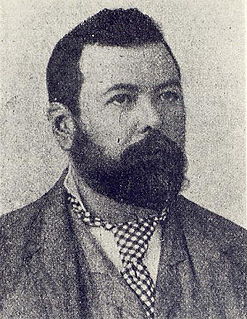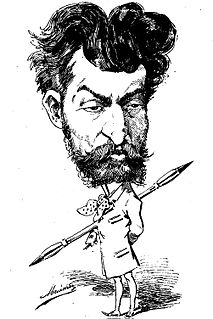Related Research Articles
Anarchism in Spain has historically gained much support and influence, especially before Francisco Franco's victory in the Spanish Civil War of 1936–1939, when it played an active political role and is considered the end of the golden age of classical anarchism.

Giuseppe Fanelli was a nineteenth-century Italian revolutionary anarchist, best known for his tour of Spain 1868, introducing the anarchist ideas of Mikhail Bakunin.

The Petroleum Revolution was a libertarian and syndicalist leaning workers' revolution that took place in Alcoy, Alicante, Spain in 1873. The event is called the Petroleum Revolution since the workers, desperate due to living conditions, carried as their standard petroleum-soaked torches. During those days, according to chroniclers, the city stank of petroleum.

The Ministry of Labour and Social Economy is the department of the Government of Spain responsible for planning and carrying out the government policy on labour relations and social economy.

Josep Llunas i Pujals was a Catalán libertarian and free-thinker. He was the principal promoter and doctrinal theorist of anarchist proto-syndicalism, which formed the basis of Twentieth Century Catalan Anarcho-syndicalism. He was also a primary advocate of Collectivist Anarchism.

Rafael Farga i Pellicer, also known as the "Just Pastor of Pellico", was a typesetter, political cartoonist, painter, syndicalist, anarchist and journalist from Catalonia.

The International Workingmen's Association (IWA), often called the First International (1864–1876), was an international organisation which aimed at uniting a variety of different left-wing socialist, communist and anarchist groups and trade unions that were based on the working class and class struggle. It was founded in 1864 in a workmen's meeting held in St. Martin's Hall, London. Its first congress was held in 1866 in Geneva.
Collectivist anarchism, also referred to as anarchist collectivism and anarcho-collectivism, is a revolutionary socialist doctrine and anarchist school of thought that advocates the abolition of both the state and private ownership of the means of production as it envisions in its place the means of production being owned collectively whilst controlled and self-managed by the producers and workers themselves. Notwithstanding the name, collectivism anarchism is seen as a blend of individualism and collectivism.

Josep Lluís Pellicer i Fenyé was a Catalan painter, illustrator and cartoonist.

The Black Hand was a presumed secret, anarchist organization based in the Andalusian region of Spain and best known as the perpetrators of murders, arson, and crop fires in the early 1880s. The events associated with the Black Hand took place in 1882 and 1883 amidst class struggle in the Andalusian countryside, the spread of anarcho-communism distinct from collectivist anarchism, and differences between legalists and illegalists in the Federación de Trabajadores de la Región Española.

The Spanish Regional Federation of the International Workingmen's Association, known by its Spanish abbreviation FRE-AIT, was the Spanish chapter of the socialist working class organization commonly known today as the First International. The FRE-AIT was active between 1870 and 1881 and was influential not only in the labour movement of Spain, but also in the emerging global anarchist school of thought.
The Anarchist Organization of the Spanish Region was an anarchist organization founded in 1888 during the last congress of the Federation of Workers of the Spanish Region (FTRE), held in Valencia. It had an ephemeral life as it disappeared the following year.
The Union and Solidarity Pact was a Spanish labor organization founded in 1888, which succeeded the Federation of Workers of the Spanish Region. It was valid until 1896.

The 1870 Barcelona Workers' Congress was a congress that brought together, from 18 to 26 June 1870, 89 delegates from workers' societies in Barcelona and in which the Spanish Regional Federation of the International Workingmen's Association (FRE-AIT) was founded. It is considered the founding act of anarchism in Spain.
The Federation of Workers of the Spanish Region was a Spanish anarchist organization founded in the Barcelona Workers' Congress of 1881 by the initiative of a group of Catalan anarcho-syndicalists headed Josep Llunas i Pujals, Rafael Farga Pellicer and Antoni Pellicer, after the dissolution of the Spanish Regional Federation of the International Workingmen's Association founded in the Barcelona Workers' Congress of 1870. It only had seven years of life since it was dissolved in 1888. Its failure, in which the episode of La Mano Negra was key, opened a new stage in the history of anarchism in Spain dominated by propaganda of the deed.
The 1881 Barcelona Workers' Congress was a congress of the workers' societies of Spain held in Barcelona in September 1881, during the reign of Alfonso XII, from which the new Federation of Workers of the Spanish Region emerged, with an anarcho-collectivist tendency, which replaced the Spanish Regional Federation of the International Workingmen's Association (FRE-AIT) founded eleven years earlier in a labor congress also held in Barcelona.
The Seville Congress was the Second Congress of the newly created Federation of Workers of the Spanish Region held in Seville in September 1882.

The origins of the labor movement in Spain are located in Catalonia in the 1830s and 1840s, since it was the only place in Spain where there was a modern industry: the textile industry. There the first conflicts between workers and employers took place and there the first trade union — called "resistance societies" at the time — in the history of Spain, the Barcelona Weavers Association, was founded in 1840. The first general strike took place during the progressive biennium - a period of extension of the movement to other areas of Spain. By 1865, the first Workers' Congress was held in Barcelona. After the triumph of the Glorious Revolution, the right to freedom of association was recognized for the first time, which put an end, at least momentarily, to the persecutions and prohibitions that the incipient labor movement had suffered during the previous forty years.
The 1865 Barcelona Workers Congress was held in December —in September, according to Manuel Tuñón de Lara - from 1865 in Barcelona (Spain) and brought together 22 Catalan workers' societies, taking advantage of a moment tolerance during the final crisis of the reign of Elizabeth II (1863-1868). It was the first workers' congress to be held in Spain, although it was limited to Catalonia.
La Federación was a periodical publication published in Barcelona during the Sexenio Democrático.
References
- ↑ Tuñón de Lara 1977 , pp. 161–162
- ↑ Termes 1977 , pp. 34–35
- ↑ Termes 1977 , p. 35
- ↑ Termes 2011 , p. 52
- ↑ Tuñón de Lara 1977 , p. 162
- ↑ Termes 1977 , p. 36
- ↑ Tuñón de Lara 1977 , p. 164
- ↑ Termes 1977 , p. 37
- ↑ Tuñón de Lara 1977 , p. 164
- ↑ Termes 1977 , pp. 37–39
- ↑ Termes 1977 , p. 39